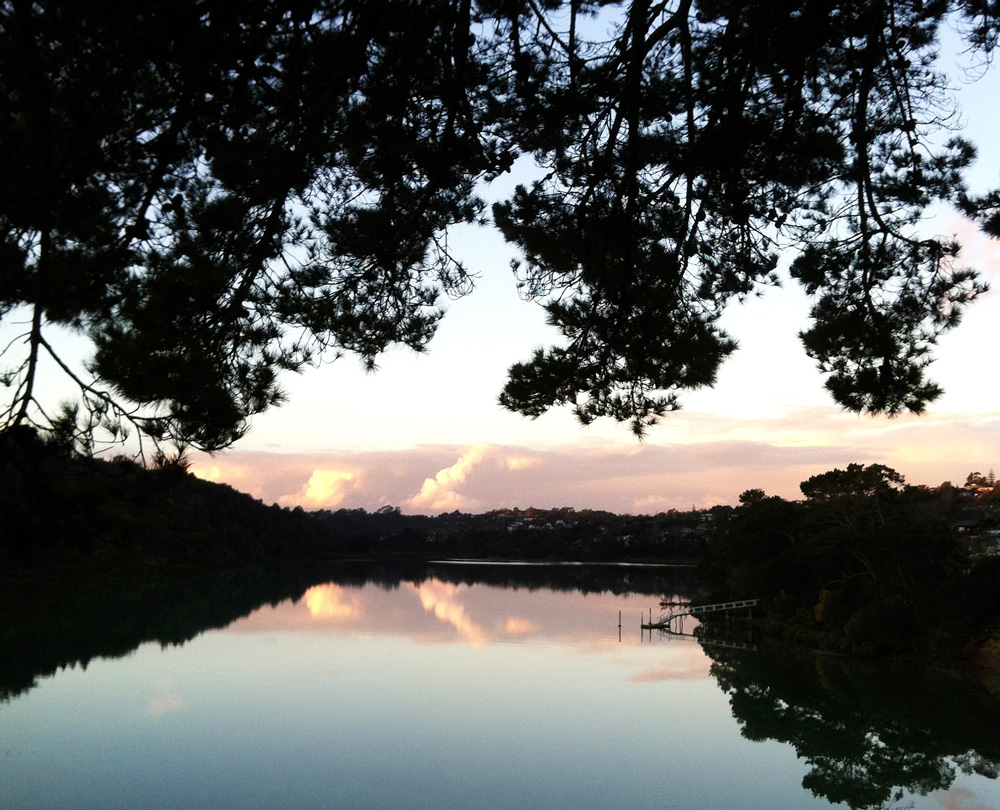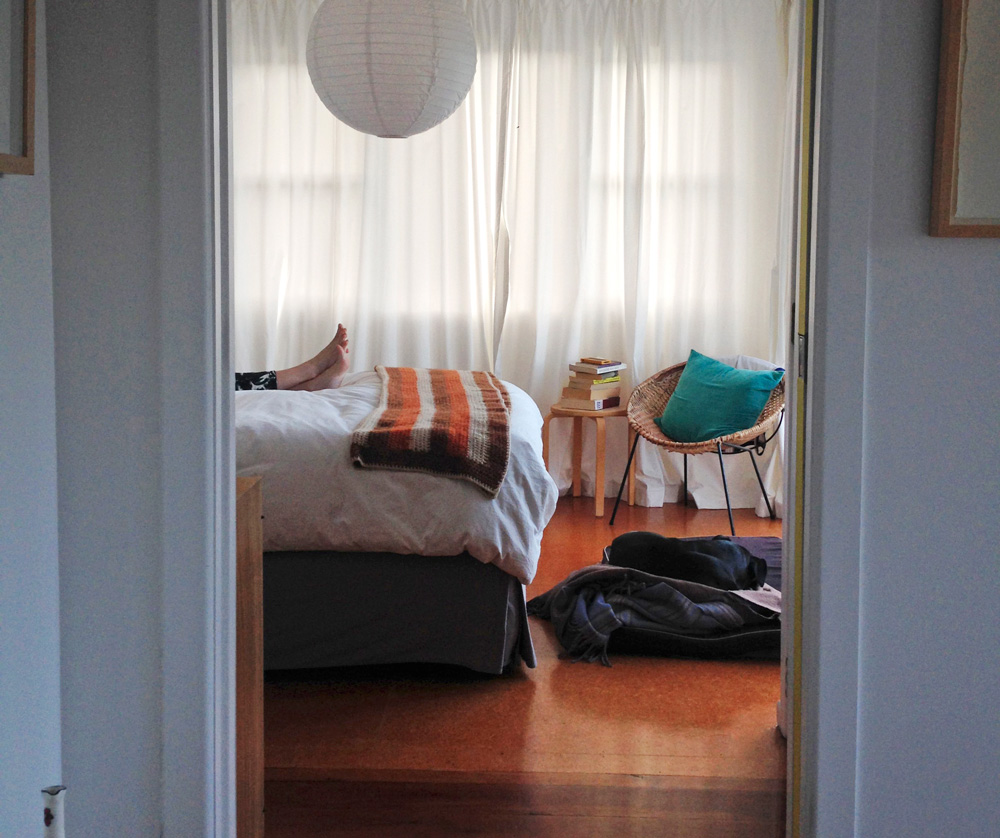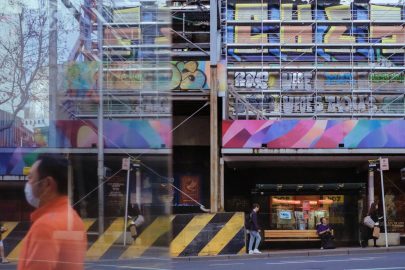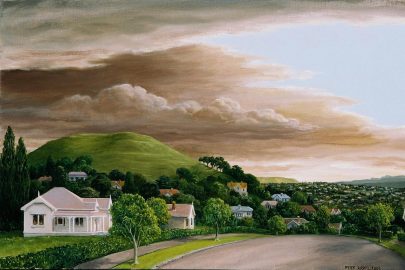May 15, 2015 Property
For about six months after moving to Beach Haven, everyone thought we’d moved to Clevedon. Is there water there, they asked? Do you have a septic tank? Do you go to the Clevedon Farmers’ Market much? And so on.
It took me a while to realise they meant Beachlands, near Maraetai. So, to be clear: Beach Haven is west of Birkenhead up the harbour. It was originally orchards and market gardens and paddocks before there were baches in paddocks with wide-sweeping views, one of which was built in 1954 from demolition timber at the end of a short, wide street that is euphemistically called an avenue. That’s 62 square metres of cottage that, these days, no longer has much of a view and seems surprised to have found itself in the depths of North Shore suburbia.
It smells different to the city — a dense, earthy smell, a mix of estuary and native bush.
A bit like us. I grew up in the eastern suburbs and moved to Grey Lynn when I was 20. I lived there, on and off, for the better part of 10 years. Two years ago, I moved from a beautifully renovated villa at the epicentre of Auckland hipsterism to… well, let’s just say there is nowhere you’d want to pay to drink coffee and nowhere that sells sopressa when you have people coming for drinks. There are four dairies in the Beach Haven shops: one sells taro and another has a shaky handwritten sign saying “NO DOGS”.
It is like being on holiday. The shops are low rise. The streets are wide. We have no footpath. The sunsets are spectacular. It smells different to the city — a dense, earthy smell, a mix of estuary and native bush. When you go to sleep, it is so dark that if there is no moon you can barely see your hand in front of your face.
There is no traffic noise. Some nights, when the tide is out, you can hear the ka-ka-ka-ka-ka of the spur-winged plover, a noisy immigrant from Australia that is my new favourite bird.
For weeks, I heard another bird laughing at me and it was only when I took to whatbird.co.nz that I realised it was a wood pigeon, and now I see them everywhere — struggling for height as they swoop across our deck, sitting in the trees down the road, huffily taking off as you walk by.
At the bottom of the road is a bush track around an estuary where I walk the dog every day. The estuary — the confluence of Hellyers/Oruamo and Kaipatiki creeks, to be precise — is so big it reaches to Glenfield. On really cold winter mornings, it steams. I take pictures of it often and post them on Instagram. I stopped for a while, when someone asked me how I was finding life in the country.
“Cut the trees Down and you’ll get a view of the estuary,” said Glenn the agent when I went to see the house the first time. My mum peered through the trees at the scrap of muddy water a few hundred metres away and snorted. The house was surrounded by an acmena hedge that was seven metres high. It was like being underwater. We went inside, to the tiny living room and the dirty yellow walls and a massive mirror that someone must have hung in the 1980s to make the room look bigger but which really just made you realise how small it was. There was a big bedroom with French doors out to the deck. The spare bedroom was a cave. The front door opened into the kitchen. The dishwasher was old and couldn’t complete a cycle.
In other words: it was perfect. The house had been on the market for six months. No one wanted it. The owners had both let the property go and priced it too high. It was the end of 2011 and the property boom hadn’t come to the North Shore yet.
I liked the big north-facing windows and the polished matai floors and the fact that it didn’t have any corridors. I liked that it was near the water. More than anything, I liked that it was cheap. Some furious negotiating, five per cent down (remember those days?), a deposit that was all the money I had in the world, and I had a contract to buy a house. I went out for drinks and someone asked me how much a taxi cost to Beach Haven. I had no idea. It’s only 20 minutes to the city, I said. I’ve done it in 16!
I dallied and was a landlord for one, hateful year, during which bathroom pipes exploded and the roof flooded. I gave notice when my tenant fell through the rotten bathroom floor. The first morning, the sound of the dawn chorus was so loud we woke up at 6am with a start. I walked through the living room, looking at my dirty yellow walls and my giant mirror and my bodged-up kitchen with the dishwasher that couldn’t complete a cycle and thought: this is my dishwasher that can’t complete a cycle.
I set to the house. I took down the curtains and the huge mirror from the living room, which I sold on Trade Me to a South African couple who arrived at 9.30pm and proceeded to argue gently in Afrikaans in the soupy summer heat while they took their car apart to fit it in. They sent me a picture of it the next day. “It really makes the room look bigger!”
The summer was magical. Hannah moved in with me after a couple of months and we bought a dog — a six-month-old Staffy-whippet-who-knows-what-else cross from the SPCA. We took the dog down to the estuary where there is a boardwalk and a big sandstone rock sticking out of the water, and we taught her to swim. At high tide, we would walk in the other direction to Larking’s Landing and I would swim in the shallow water, out to the moored yachts and back. One night, I stood in the doors off our bedroom, looking out at the estuary and Greenhithe Hill in the distance, and I felt like we’d gone away for the night and rented a house somewhere out of the city.
A group of local kids adopted us. Paitea and his friends were smelly and dirty and came by about 4.30 every day for most of the summer and took the dog for a run in the park, which suited me just fine. They were bored. They liked the dog. They sat on the kitchen floor and farted and giggled. One afternoon, one of them stood in front of our TV. “Is that your TV?” he asked, looking confused, reaching out to touch the flat screen.
Yep, I said, feeling very white and very middle class.
“Fahhhh, it’s small, eh?”

Then, the new Beach Haven-Hobsonville ferry service started, and suddenly we felt connected to the city. Auckland Transport built a fancy new terminal down at the wharf that cost a million bucks. Len Brown and John Key opened it: the ferry left for the first time and left Len behind, and had to circle back and get him. Beach Haven made the news.
Hannah catches it to work each day. The three of us — she, me, the dog — walk to the ferry every morning. She gets on and it motors away and the dog and I walk along the beach and every morning it is different. In winter it is crisp and in summer there is the promise of heat and the smell of dew. Sometimes there are rowing skiffs, the sound of the cox murmuring to his crew echoing across the water. It is foggy in winter, dense and heavy and it doesn’t lift until 11. One sunny morning, there was a very fat man walking along the beach with a fishing rod. “It’s one out of the box!”
It’s a return to form for Beach Haven, which started as market gardens and strawberry fields — back then it was called Birkdale and everything came in and out by scow from a number of wharves.
The place never really had its own identity until 1923, when the Birkdale Land Company bought a big chunk of land down near what is now the wharf and released sections for baches, calling it “Beach Haven Estate” and “the gem of the Waitemata”.
But it wasn’t until the 1970s that the name started to be used, which is possibly why no one knows where it is. The Haven has a curiously diverse population — there are state houses on one side of Rangatira Rd, multimillion- dollar houses with jetties and riparian rights on the other, and solidly middle-class suburbia in between. My theory: it wasn’t until Birkdale came to represent cheap, cookie-cutter subdivisions that the name Beach Haven took hold.
They named the streets after family cars: Cresta, Gazelle and Rambler, which is a bit like renaming your streets Corolla, Focus and i30. In one fell swoop, they took the place from cute village by the sea to full bogan.
There is confusion as to whether it is one word or two, as if the place never counted for enough to worry. There is the Beachhaven Scout Hall and the Beach Haven Leisure Centre which has a sign pointing to the Beachaven Sports Centre where you will find the Beachhaven Tennis Club. There’s more: there is Rambler Crescent, which isn’t actually a crescent and wasn’t always called Rambler — in the 1960s, the post office introduced a new national postal service. Our street and two others were renamed because the originals — Tui, Pohutukawa and Kowhai — were too common. Instead, they named them after mid-priced family cars: Cresta (a Vauxhall), Gazelle (Singer) and Rambler (Nash), which when you think about it is a bit like renaming your streets Corolla, Focus and i30. In one fell swoop, they took the place from cute village by the sea to full bogan, a baptism from which it has never really recovered.
The park near the wharf is named after some fine county councillor from the 1970s who I’m sure did some valiant service, but no one’s ever heard of him and everyone calls the area Larking’s Landing anyway — after Frank Larking, the retired airman who over several decades acted as a sort of self-appointed wharf guardian.
He built a groyne by hand to create a beach and painstakingly re-sanded it, transporting raw materials over hundreds of trips, without ever getting a consent. He kept detailed notes of his dinghy’s cargo in notebooks: yards of mud, buckets of sand. He did all this with limited mobility, after suffering paralysis down the right side of his body from an operation in 1955 to remove a blood clot on his brain. “Cos the name Beach Haven means Beach Haven. Not a mud hole,” he said in a YouTube documentary by journalist Yeshe Hegan in 2003.
The authorities got a bit shirty in 1974 when they realised he had never asked for permission, though after a bit of argy-bargy, the community convinced them Frank was right. To honour this effort, the Frank Larking Support Group wrote to the Guinness Book of Records to get them to include him as the only man in the world to have built a beach. (Guinness, sadly, declined.)
Frank died in 2008. I think of him most mornings when I walk along the seawall, his handy bronze cleats for tying up boats burnished by the sun and occasionally rusting away. It’s hard not to, since he built various seats in memoriam to his late wife and son and friends and signed them FRANK LARKING. “This is Beach Haven,” he told Hegan. “It’s a special place. There’s many people who go back to Beach Haven. Because it is Beach Haven.”

By the middle of our first winter, the acmena trees were huge. They blocked the gutters and water ran down the inside of the bedroom wall in the middle of the night. In summer, the trees were a breeding ground for mosquitoes and in winter they shaded the deck. For six months, we couldn’t see the sunset and the living room got darker and darker until we finally scraped together some vast amount of money and paid Mike the Arborist to cut them down to size. Glenn was right: we can see patches of the estuary, which is by turns blue, grey or brown, backed up by a hill of bush.
We insulated, put in a heat pump, bought nice white rolling blinds, painted everything white (Resene Alabaster; it was that or something called “Rice cake”) and told ourselves we didn’t miss the city, not a jot. We threw a dinner party for 20 that filled the entire house and, one weekend, we stripped the wallpaper off the bedroom walls and sanded all the windows back before painting everything pristinely white.
People said things like, “When you next come into the city…” as if we lived in Warkworth.
By spring, we were frustrated. Mainly, we were over the driving. One poorly planned Friday, I did it four times between 9am and midnight, a total of 160 minutes’ driving time. Two and a half hours in the car! It felt like all our friends lived 20 minutes away and no one came to visit unless we cajoled and they shared taxis or nominated a sober driver. They seemed bemused. People said things like, “When you next come into the city…” as if we lived in Warkworth. We developed an acute nostalgia for Dominion Rd.
It felt like everything good happened 20 minutes away. It felt like every time we wanted to stay out late we had to organise ourselves militarily — one car or two? Taxi or who’s driving? Can we afford $50 for a taxi? What does it cost to get a cab from Sandringham rather than the city, anyway? I testily reminded a really good friend that the bridge went two ways and she came for a drink but she could only have one and then I felt guilty.
Against our better judgment, we started looking cityside. We found a two-bedroom 1970s townhouse on the water — well, on the mud, of which I was quite fond by that point — in Waterview. The agent gave us a price bracket and we did due diligence. A man paid a lot of money for it; in fact the bidding started above us, and so we started looking in New Lynn and Blockhouse Bay — which we realised is the same travel time from the city as Beach Haven. So, because by then we quite liked the water and the bush and were “acclimatising” to life on the other side of the bridge, we looked in Northcote, then Birkenhead, before, eventually, we realised what we could actually afford was…
Beach Haven.
Where, suddenly, people were getting silly money for houses. I called two agents, including Glenn. The house was worth half as much again as we’d paid for it. We got a new mortgage — one of those where you get a good interest rate because you have more than 20 per cent equity, and felt very grown up. We renovated most of the bathroom intending to sell, and then we ran out of money but we did fix the bloody rotten floor at least. Someone bought the house on the corner, repainted it, and sold for a hundred grand more. After a few months of looking, we found ourselves at an open home over the back fence and comparing the view, and we decided to stop looking at real estate.
Summer came and turned into autumn, and I remembered everything that is good about where we live. The smell at night, a mix of dew and grass and estuary, clean and fresh and somehow not citylike. Swimming out to the boats in the harbour. The birds in the trees in the morning and the spectacular sunsets. The morning ritual of walking to the ferry and not getting on it. I stand in our living room when the tide comes in and watch the glint of the sun on the water and marvel at the serenity.
Some days, the drive bothers us. Other days, it’s just long enough to work something out in your head or catch a full interview on the radio. The views of the harbour are lovely, and the point at which you accelerate around the Onewa Rd onramp with the city in front of you is wonderful, especially at night. It’s a sensation — almost an emotion — that no one ever tells you about, almost as if they were keeping it to themselves. I catch the ferry into the city at night to go to a gig and I stand on the back of the boat watching the lights of the suburbs and the purple light on the harbour and feel incredibly lucky.
But the moment everything really changed? We got married, and a few weeks before, we found out Hannah was pregnant with our first child. We are renovating to make room for our new family, and this will be the place we bring him back to. That counts for everything.
One afternoon, I was walking the dog along the estuary and the sun was glinting off the water and I came along the boardwalk to the rock and there were two Middle Eastern men standing there. “Beautiful! Is paradise!” one of them exclaimed.
Yes, I said, I think you might be right.
This story first appeared in the April 2015 issue of Metro. Illustration by Angela Keoghan; photos by Simon Farrell-Green.
Suburban Man, Simon Farrell-Green’s column on life in the suburbs, appears monthly in Metro.





